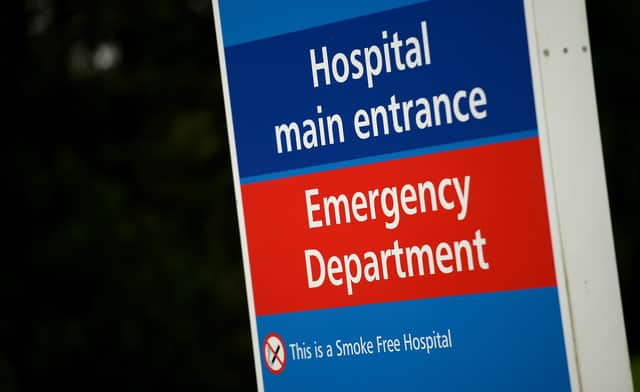Patient experience at Barking, Havering and Redbridge University Hospitals Trust worsens


Patients' experience at Barking, Havering and Redbridge University Hospitals Trust worsened last year, new survey data suggests.
Hospital regulator the Care Quality Commission, which carried out the survey, said the long-term worsening of patient experience in NHS emergency care cannot be ignored.
Advertisement
Hide AdAdvertisement
Hide AdThe 194 respondents in Barking, Havering and Redbridge University Hospitals NHS Trust gave the hospital an average of 6.7 out of 10 for overall experience in 2022.
It is down from a score of 7.5 out of 10 when the survey was last done in 2020.
Nationally, 18% of respondents gave a score of four or lower, with zero being a very poor experience. It was a leap from 8% two years prior.
The CQC has previously said high call volumes and staff shortages in NHS 111 are leading to delays in people receiving medical advice and more people going to A&E.
Advertisement
Hide AdAdvertisement
Hide AdA lack of available GP and dental appointments means NHS 111 cannot always send people to those, leading to people being asked to call 999 or go to A&E instead, it added.
The survey also shows the proportion of people feeling they were treated with respect and dignity in hospitals across England declined from 81% in 2020 to 72% last year.
Patients gave Barking, Havering and Redbridge University Hospitals Trust a grade of 7.6 out of 10 on the matter – down from 8.4 in the previous survey.
Mamta Shetty Vaidya - Barking, Havering and Redbridge University Hospitals Trust’s chief medical officer - said: “The results are not good enough and I am sorry about the waits people face and the poor experience they have had.
Advertisement
Hide AdAdvertisement
Hide Ad“These patients were surveyed in September last year and we have made significant changes since. Our performance for those who are most seriously ill (Type 1) is the best it’s been in recent years. This is predominantly down to opening new Same Day Emergency Care departments where people are moved out of A&E, assessed and have their treatment started on the same day.
“We’re working hard to keep improving and we know we have a long way to go. We’re also tackling some of the key issues our patients have told us about, including speeding up initial assessments on arrival and better communication.”
Dr Adrian Boyle, president of the Royal College of Emergency Medicine, said: "These results give a view of urgent and emergency healthcare through the eyes of the patient and reflect the challenges medical professionals working in urgent and emergency care experience every day."
"Every clinician wants to provide the best care possible. No one wants patients to have to wait excessive amounts of time to be treated, or for that treatment to be administered in an environment – such as a corridor – which lacks privacy."
Advertisement
Hide AdAdvertisement
Hide AdDr Sean O’Kelly, the CQC’s chief inspector of healthcare, said staff are working extremely hard amidst challenging circumstances.
However, he added: "We cannot afford to ignore the long-term decline shown in relation to issues like waiting times, information provided when people leave to go home, access to pain relief and emotional support."
The proportion across England of patients who said they waited longer than four hours to be examined in A&E last year more than quadrupled to 17% – up from 4% in 2020.
In Barking, Havering and Redbridge University Hospitals Trust, patients gave a score of 4.4 out of 10 regarding the length of time they waited to be examined – a fall from 5.5 two years earlier.
Advertisement
Hide AdAdvertisement
Hide AdAn NHS spokeswoman said staff have delivered significant improvements since this survey was carried out, with faster ambulance response times and a greater number of patients being seen in A&E within four hours in June.
She added: "This is despite unprecedented levels of demand, pressures on patient flow and industrial action."
She said the findings also demonstrate how patients value the "hard work and care from staff".